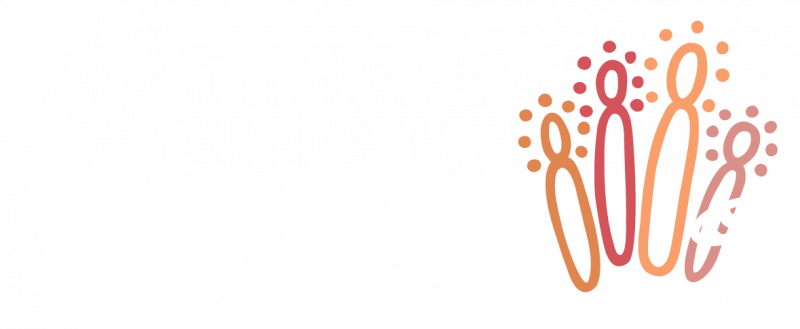The AGPAL Group of Companies acknowledge the Traditional Custodians of the land on which we live and work, and recognise the continuing connection to land, waters and culture. We pay our respects to Elders, past, present and emerging, and acknowledge Elders as the holders of knowledge, lore and wisdom.
We respectfully acknowledge the cultural sensitivities surrounding Sorry Business, Sad News and ‘finishing up’.
Aboriginal and Torres Strait Islander peoples are advised that this website may contain images, videos and voices of people who have passed away.
Welcome to Yaama Yarns the first newsletter for the Gwandalan Project. Courtesy of SpiritalCleansing.org
Courtesy of SpiritalCleansing.org
In mid-2020 Australian General Practice Accreditation Limited (AGPAL), in partnership with Palliative Care South Australia, commenced the co-development of education and training materials aimed to support cultural safety within palliative care services for Aboriginal and Torres Strait Islander peoples.
Education and training materials for the Gwandalan Project aim to support relationships between service providers, frontline staff and Aboriginal and Torres Strait Islander communities through the support of cross-cultural education and the sharing of knowledge.
Gwandalan Project does not address clinical palliative care content, but rather supports the culturally safe and responsive provision of palliative care, by upskilling frontline staff to contextualise clinical care for Aboriginal and Torres Strait Islander peoples and deliver services in a way which supports a good ‘finishing up’.
Gwandalan launched in July 2021 with all modules now live. Access to eLearning modules is free upon registration at: www.gwandalanpalliativecare.com.au/. Gwandalan training is accredited for both the Australian Association of Practice Management (AAPM) for 5 Continuing Professional Development (CPD) points per module and for the Royal Australian College of General Practitioners (RACGP) for 2 points per module.
Gwandalan Project is very fortunate to be guided by passionate Aboriginal and Torres Strait Islander Review and Content Development members. The Gwandalan team would like to thank our Review and Content Development members Jonathan Jauncey, Kathryn Hooper and Uncle Wayne Christian for their contribution, guidance and ongoing support to the Gwandalan Project.
|
Who’s that Palliative Care Mob?
Sharing the story of one family’s journey of understanding and accessing palliative care, this newly developed Gwandalan resource aims to inform community members on the services and supports available for those on their returning to Spirit journey. With much appreciation we acknowledge Jonathan Jauncey for sharing his own personal story and experience with palliative care to inspire the yarning for this resource. Stay tuned for resource development updates and release information. |
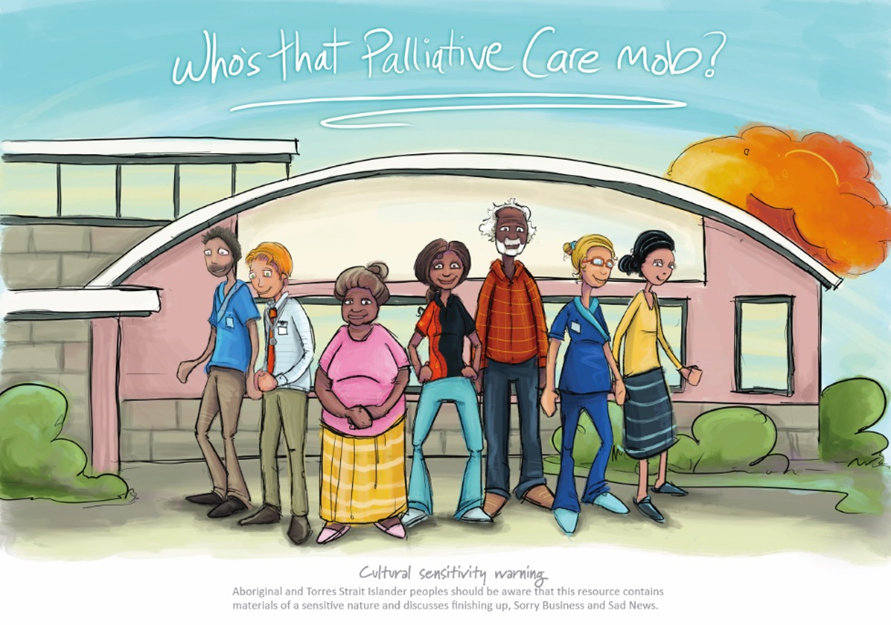 |
Palliative Care SA as a key partner in Gwandalan, and PEPA SA (also managed by PCSA in South Australia) were pleased to be part of the South Australian Aboriginal Health Workers Workforce Conference on June 29th 2021.
Organised by the South Australian Health Aboriginal Workers Network (SHAWN), the day included nearly 150 workers from across the state as they discussed contemporary issues such as COVID and how they maintain self-care and resilience.
Held at the picturesque Adelaide Oval, there were opportunities to have some really targeted conversations on the day. The organisers through Ms Cindy Paardekooper and SHAWN brought together a stimulating and challenging program for the day as participants looked at future plans.
A number of participants approached the table and expressed the need to make sure that palliative care was picked up as an emerging priority for health. It was also pleasing to speak with Aboriginal Health Workers who had been on PEPA placement and hear their enthusiasm for ongoing education and support.
Subsequent feedback showed that there was great interest to do some education around palliative care, particularly for the Non Aboriginal workforce around culturally responsive care for Aboriginal people. More opportunities were identified for PEPA visits as people were conscious that some patient end of life experiences lacked cultural finishing business, potentially due to lack of education.
As a part of the webcast, Having a Yarn – Final Footprints: My Culture, My Kinship, My Country hosted by Palliative Care Australia to celebrate NAIDOC Week 2021 the video Final Footprints: My Culture, My Kinship, My Country was launched.
Palliative Care South Australia was thrilled to be a part of the Final Footprints process, working with Edoardo Crismani, David Rathman, Jonathan Dodson-Jauncey, Lenore Bagnara, Darnelle Chantrelle and Uncle Eddie Peters. The video explores the importance of Country to First Nations’ peoples, perceptions of death and dying and many other important topics.
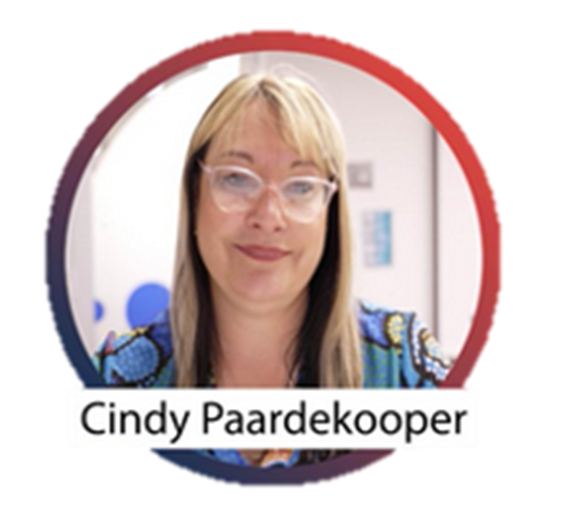 |
The Panel discussion that followed the viewing of Final Footprints also included Ms Cindy Paardekooper, a Kokatha woman from the far west coast of South Australia who continues to be a champion and strong advocate for Aboriginal palliative care across Australia. Cindy has worked extensively in the National Program of Experience in the Palliative Care Approach (PEPA) Program and Palliative Care in the Northern Territory and South Australia; and is the South Australian Health representative on the National Aboriginal and Torres Strait Islander Palliative Care Advisory Group. Cindy has a strong desire to support and advocate for Aboriginal people, their families, and communities to achieve improved life outcomes and maintain strong connections to culture, kin, and country. |
To view the Webcast Having a Yarn – Final Footprints: My Culture, My Kinship, My Country click here.
To view the Final Footprints: My Culture, My Kinship, My Country video, watch below.
As Aboriginal and Torres Strait Islander peoples, many of us believe you are born from the earth to walk the earth, and when the time comes, your Spirit returns to the earth. How you return to the earth, and the peace your loved one’s experience during that time are all important parts of our culture and grief journey.
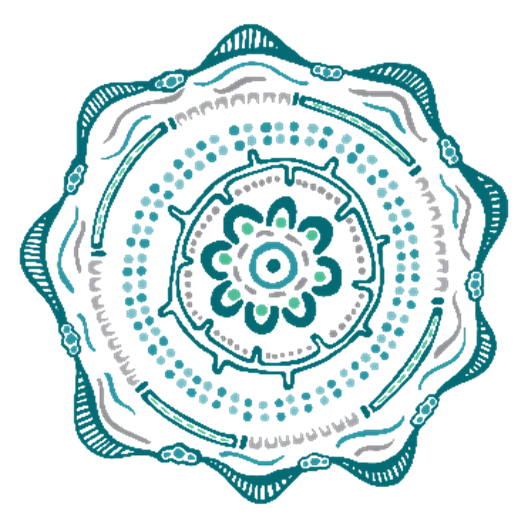 |
Despite advances in modern medicine, sometimes medical conditions such as advanced kidney, lung, heart disease, dementia and other age-related deteriorating conditions cannot be fixed. If a person has a life-limiting condition, meaning they cannot be cured and it will lead to the end of their life, the focus of care shifts from cure to making sure they have the best quality of life. This is known as palliative care.
Similar to our Aboriginal and Torres Strait Islander concept of health, palliative care holistically embraces the physical, emotional and cultural well being of a person and their family, to ensure this journey is one of comfort, dignity, cultural respect and honoured wishes. Having palliative care doesn’t necessarily mean that a loved one is likely to pass soon. You can receive palliative care for years. It can take place on Country, at home, in a residential aged care facility, in a hospice, or at a hospital. |

It is important to highlight that we, as Aboriginal and Torres Strait Islander peoples, have an ongoing heritage of loss and racism. For a person close to passing and for their loved ones, the impact of the loss and grief is compounded by earlier experiences. Many of us avoid talking about the end of life journeys with our clients, community or family members and are less likely to access palliative care and so many of us are in perpetual cycles of grief and trauma.
Accessing palliative care offers a unique opportunity to bring much healing to our loved ones and break these cycles for our families and communities but it begins with a yarn. A yarn about how our loved ones would like to be honoured, what their wishes are and how they would like to be supported to be comfortable as well and where and by whom. These yarns often lead to a positive palliative care experience where every moment can be spent together enjoyably and present before they enter the Dreaming or Tagai.
When our loved ones pass, there is still grief but when they pass in a way that is celebrated, fulfilled and dignified, the entire experience of our grief changes to one of healing. This why palliative care is important for our mob.
Whether you are a health professional, a brother, sister, cousin, mother, father, aunty or uncle – you have a right to palliative care and the sovereignty, dignity and respect that it brings.
If you are interested in knowing more about culturally-responsive, healing informed palliative care and your role in breaking down the barriers to accessing this human right for our mob, Indigenous Program of Experience in the Palliative Approach (IPEPA) have free placements and training workshops available to you. Reach out to IPEPA at Nicole.hewlett@qut.edu.au and IPEPA on Facebook.
Rowena is a proud and strong Gooniyandi & Ngarinyman woman from Kununurra (WA), who until four years ago knew little about organ and tissue donation, until her beautiful daughter Macaiah, aged 20, passed away suddenly.
Rowena and her family were approached by the health staff in ICU to discuss the possibility of organ donation. This discussion led to the family making the most difficult decision they have ever made, but one they don’t regret.
Although organ donation is a sensitive subject in Aboriginal culture, Rowena and her family believed it was important and hoped that Macaiah’s organs might match with other Aboriginal patients on the transplant waiting list. They also believed it allowed Macaiah’s spirit to live on in the three people who received her organs.
Gwandalan would like to acknowledge Macaiah and her family, and are grateful and honoured to be able to share her story. We also acknowledge Macaiah’s family and DonateLife for the use of this video.
For more information on organ and tissue donation visit Donate Life.
16 September 2021 saw the Voluntary Assisted Dying Act 2021 (Qld) passed by the Queensland Parliament. Voluntary assisted dying (VAD) will commence in Queensland on 1 January 2023, following an implementation period.
VAD laws have now been passed in five of Australia’s six States – Victoria, Western Australia, Tasmania, South Australia, and Queensland. Victoria’s and Western Australia’s VAD laws have commenced operation. VAD will commence in Tasmania on 23 October 2022, and in South Australia in late 2022 – early 2023.
The Queensland Act is similar to other States’ that have VAD laws, with some key differences including:
To gain an overview of the law in each State, please visit the End of Life Law in Australia webpage.
Find Gwandalan education resources on the new Palliative Care Education (PaCE) Directory app.
PaCE is a resource directory for educators and health and aged care providers in the form of a mobile-responsive web-based app. PaCE helps you find learning resources that support the development of palliative care capabilities for a variety of professions and practice contexts. The directory includes information about learning approaches and modes of delivery for each resource.
PaCE is free to use, and all learning resources are free to access. PaCE is an initiative of the Palliative Care Education and Training Collaborative, led by QUT.
For more information visit PaCE.

Lorenz Pilkington
Aboriginal Liaison Officer
Territory Palliative Care (TPC)
Larrakia Country – Royal Darwin Hospital
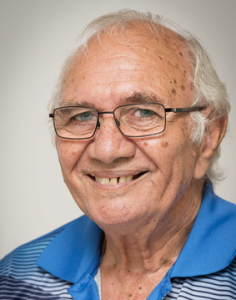 I was born on Noongar Country, grew up on Yamatji Country and been in Darwin for the last 35 years.
I was born on Noongar Country, grew up on Yamatji Country and been in Darwin for the last 35 years.
Palliative care for is me, personally, it’s probably one of the best things where a person can come, provided its early can have a much better outcome, it’s not going to cure the disease or illness, what it does is prepare people for a much better outcome, when they are getting close to finishing up.
We have an amazing remote area nurse here. We focus on that person, and if they want to go back to Country, we get their pain management under control, get all the symptoms under control then we sort a plane and get them back home as fast as we can so that they finish up on the Country, because you know Country is important for our mob to finish up on. Some people choose to stay here, all depends on where they come from.
Yeah, I think one of the problems that we have in palliative care is the reputation that been developed, that people know this is the place (hospice) where everyone dies and of course we’re all going to die somewhere, somehow along the line at some time. But what palliative care does, is we take away the stigma of what it is. When our mob come in here, they come into a place where they are welcomed, we provide care, we look after all their needs and if they finish up here, we turn off the alarms and let all patients know in the hospice that’s there is going to be a smoking ceremony and some wailing. We are very culturally aware. We support all different cultures, we try to do the best that we can to cater for all cultures.
Advance care yarning is very important, its one of the most important documents that patients can fill in, we go through it and talk about it. We use the discussion starter which is a great document, so we get people thinking about what is the most important things that are important to them and it’s getting all their wishes down on paper. So that when that time comes, there’s no arguments. Sometimes there is issues with this person got to finish up on that Country or this Country and its his decisions where he wants to go. There may be other secondary decision makers as well and they may need to be consulted and this can be written down. What we find is that, when you get all those important bits and pieces down on paper, it can be transferred onto a legal document, it takes away issues where there might be fighting within the families and that person’s wishes will be carried out.
We have a great team, the team I work in is remote and we have a great nurse here who goes above and beyond to get our mob home. We work with a good team of doctors. We often visit Katherine, while we are there we deliver some education around advance care planning. We talk about our pain management systems, the plans and what we do with pain management and how we help people cope with their pain. Our Nurse Practitioner looks after our aged care as well. I work with all other staff in the team.
We have had very young people in here and we have supported the family through those hard time. At times just being in the room when the doctors are in there can help the family understand what the doctor is saying. Sometimes people are a bit reluctant to talk but after a little while, once you establish that good relationship and you ask people where they are from, tell them where you are from and that puts people at ease.
It’s a funny thing, this is probably one of the best places I’ve ever worked in my life. It taught me something about myself. What it has done for me and the learning curve, is taught me humility. People here at the end-of-life, it doesn’t matter what culture they are can still teach you, they know they are going yet they still offer something.
Hospice is not like the hospital, it’s more like family.
It may be a wife taking care of a husband or the other way around. They may be doing that at home and sometimes we bring them in here (hospice) for respite. So they can just be a couple again and we can take care of all the rest.
It’s a privilege to be able to be apart of. I had another family here that I’ve known for 30 years, the Dad was palliative. The family asked me to be in the room when he passed. That was a very spiritual thing. We know its end-of-life but if they are having a good death than it’s a pleasing thing. It’s a funny thing to say but that how it feels if they go peacefully and there’s no more pain.
After supporting families who have lost a loved one, it is hard on staff however here, you can go and talk to anybody for support, one of our doctor’s or a nurse or one of our social workers.
I find music for me is a good self-care medication that helps. I go home and I’ll get on the guitar and might play for an hour. This helps me get re-grounded. Sometimes my little grandson will come over and we go to Wagait Beach. His parents come out and camp on the beach, I grab the little fulla and take him down creek, throw a line in and catch some fish.
I watch a lot of documentaries on NITV as well. One of the ones I’ve been watching lately has been really grounding me. Its called ‘Back to Nature with Aaron Pederson’. He’s going right across Australia. The way that’s its presented just really grounds me. It makes me think that you are just a tiny speck in the universe but we are a very important part of it.
They are important things that helps me to really ground and then I’m ready to go again.
Kaya / Kiya means hello in Noongar language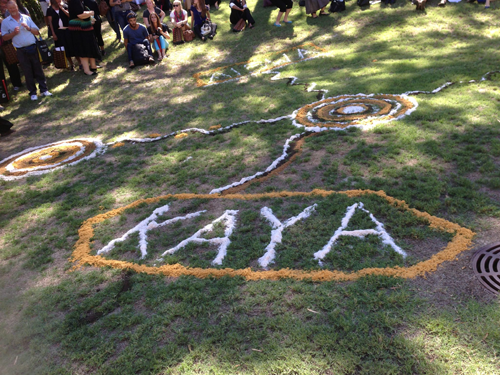 Kaya (Hello). Drawn by Roni Forrest for the Aboriginal Cultural Expo at Curtin University, 22 March 2013. Courtesy of SWALSC |
Eso means thank you in Creole language of the Torres Strait |
Didja know, a total of 1,142 palliative care and 728 other end-of-life care hospitalisations for Indigenous Australians were reported in 2018–19, with the majority occurring in public hospitals (94.2% and 97.3%, respectively). This compares to 88.5% of all hospitalisations among Indigenous Australians that occurred in public hospitals.
myth: Palliative care is only for old fullas with cancer.
Palliative care is for anyone living with a life limiting illness that cannot be fixed or cured, including chronic diseases such as kidney, liver, lung and heart failure, dementia and other neurological illnesses as well as certain conditions among children.
| Uncover the secrets of the next life…
David Kessler, one of the most renowned experts on death and grief, takes on three uniquely shared experiences that challenge our ability to explain and fully understand the mystery of our final days. The first is “visions.” As the dying lose sight of this world, some people appear to be looking into the world to come. The second shared experience is getting ready for a “trip.” These trips may seem to us to be all about leaving, but for those passing away, they may be about arriving. Finally, the third phenomenon is “crowded rooms.” The dying often talk about seeing a room full of people, as they constantly repeat the word crowded. In truth, we never die alone. Just as loving hands greeted us when we were born, so will loving arms embrace us when we die. In the tapestry of life and death, we may begin to see connections to the past that we missed in life. While death may look like a loss to the living, the last hours of a dying person may be filled not with emptiness, but rather with fullness. In this fascinating book, David brings us stunning stories from the bedsides of the that are passing away that will educate, enlighten, and comfort us all. |
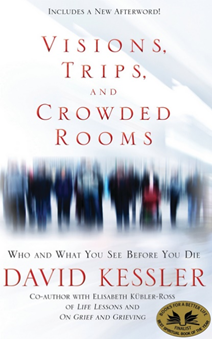 |
Centre for Palliative Care Research and Education (CPCRE) Anniversary Research Conference 2021
‘Brave New World’ – Palliative Care Post-Pandemic
Date: Friday 22 October 2021
Cost: $129
Venue: Royal Brisbane & Women’s Hospital – QLD
To register: https://www.trybooking.com/events/landing?eid=789528
Gwandalan Workshop
Training for frontline health professionals delivering palliative and end-of-life care for Aboriginal and Torres Strait Islander peoples.
Date: 9th November 2021
Cost: Free
Venue: Queensland Aboriginal and Islander Health Council (QAIHC) – QLD
To register: https://www.eventbrite.com.au/e/gwandalan-palliative-care-tickets-177008937497
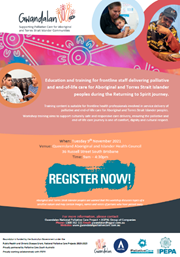
Indigenous Wellbeing Conference
Connecting Communities and Services to Close the Gap in Social & Emotional Wellbeing
Date: 6-7 December 2021
Cost: $437 – $1044
Venue: Virtual & The Pullman Cairns International – QLD
To register: https://iwc.anzmh.asn.au/?utm_campaign=IWC
The State of Palliative Care Symposium 2021
The State of Palliative Care Symposium (Strengthening our Workforce) is a key professional development event.
Date: 23 November 2021
Cost: $55 – $95
Venue: C3 Convention Centre – Hobart TAS
To register: https://www.pallcaretas.org.au/symposium-2021-registration/

National Carers Week – 10-16 October 2021
National Carers Week is an opportunity to recognise, celebrate, and raise awareness among all Australians about the diversity of Australia’s 2.65 million carers and their caring roles.
Breast Cancer Awareness Month – October 2021
Australia’s Breast Cancer Awareness Month in October, provides an opportunity for us all to focus on breast cancer and its impact on those
affected by the illness in our community.
Breast cancer is the most common cancer experienced by Aboriginal and Torres Strait Islander women and is the second leading cause of cancer death after lung cancer. Research shows that survival is lower in Aboriginal and Torres Strait Islander women diagnosed with breast cancer than in the general population.
